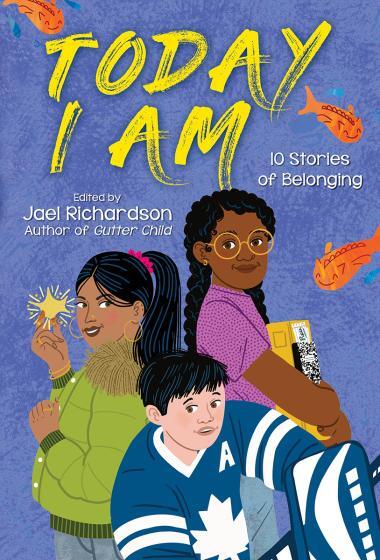Today I Am: 10 Stories of Belonging

Today I Am: 10 Stories of Belonging
To know myself more every day,
that will be my goal.
To turn toward light and warmth
like a plant growing in the soil –
to be myself and love myself,
as I grow wise, as I grow old,
to know that I am human, beautiful and whole,
to know that as long as I have love
I’m never far from home. (From “Yesterday I Was, Today I Am, Tomorrow I Will Be”, p. 230)
This collection of 10 short stories focuses on belonging. In his “Introduction”, Jael Richardson tells readers: “Have you ever felt like an outsider?...Today I Am is a collection of stories about kids who encounter moments of change, who want to feel more connected to someone or somewhere, who are struggling with or embracing what it means to truly belong.” (p. vi) The stories explore a variety of topics related to the idea of belonging: self-awareness, family, community, identity, and friendship. These concepts continue to be important to young people in the aftermath of their COVID-19 pandemic experiences with social and emotional isolation from school, community and friends.
Ten skilled Canadian writers contributed to this anthology of short stories using a variety of genres to explore their take on belonging. Martin Chan’s “In a Flash” is a fantasy/horror/mystery story about travelling through time. Liselle Sambury’s science fiction narrative “Where the Mulberries Grow” explores space travel and life on new planets. “The Memory Fish”, by Rosena Fung, is a science fiction graphic narrative about living in the future. In “A Feathered Sakr,” Danny Ramadan describes life in Damascus during wartime in this horror/fantasy.
The very first story, “The Secret Cousin”, explores many issues including: family conflict, prejudice, interracial marriage, religion, tradition, friendship, and sexuality. Lonnie, Talia and their mother travel to Cambridge, Ontario, to celebrate Thanksgiving with their estranged family. Teenager Lonnie and his little sister Talia will be seeing their white relatives for the first time in seven years. Their mother will be seeing the family which has rejected her. Her parents and siblings are very religious. They also did not approve of her marriage to a Black man in Nova Scotia where she went to university. However, when they arrive, they find a family which wants to make amends. Lonnie befriends his cousin Owen who confides an important secret to him about his sexuality. This story explores feelings of belonging as well as understanding and forgiveness.
The last story, “Yesterday I Was, Today I Am, Tomorrow I Will Be”, is written in poetic form. As the story begins, Uri is entering his elementary school for his last year. Everyone is excited and happy to see each other. Their principal, Mr. Henry, speaks to the grade eight students and challenges them to write a speech entitled “Yesterday I Was, Today I Am, Tomorrow I Will Be” for a special end-of-year assembly. At first, Uri struggles with the assignment, wondering, “What will people think? What will I say?” However, he starts to realize that his speech will reveal his past, his present, and his future. He is part of a family which emigrated from Jamaica. His friends enjoy watching the Toronto Raptors, and he works hard to perfect his basketball moves. He also loves to express himself in poetry and sees himself as a poet in the future. As he works through his project, he feels a true sense of belonging.
The Canadian writers who contributed to Today I Am have created a touching and vibrant collection of stories which will appeal to a wide range of readers. The topics explored are wide-ranging: time travel, moving, life on other planets, Indigenous community, problem-solving, stereotyping, war, loneliness, sexuality, bullying, nuclear testing, family and grief.
Both male and female readers will appreciate this collection of stories for their examinations of belonging. Rosena Fung in “The Memory Fish” explained the strength of this anthology, “My stories are yours too.” However, perhaps the most memorable message to readers appears in Jael Richardson’s “The Invention of Serene Brown” where he writes, “Being different isn’t bad. It doesn’t make you weird. It makes you special.”
Myra Junyk, who lives in Toronto, Ontario, is a literacy advocate and author.
